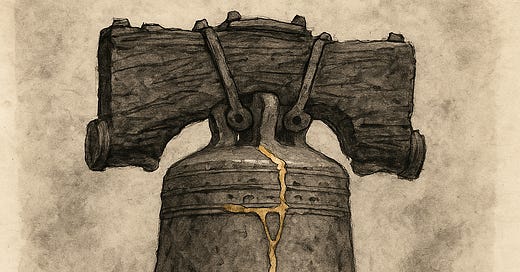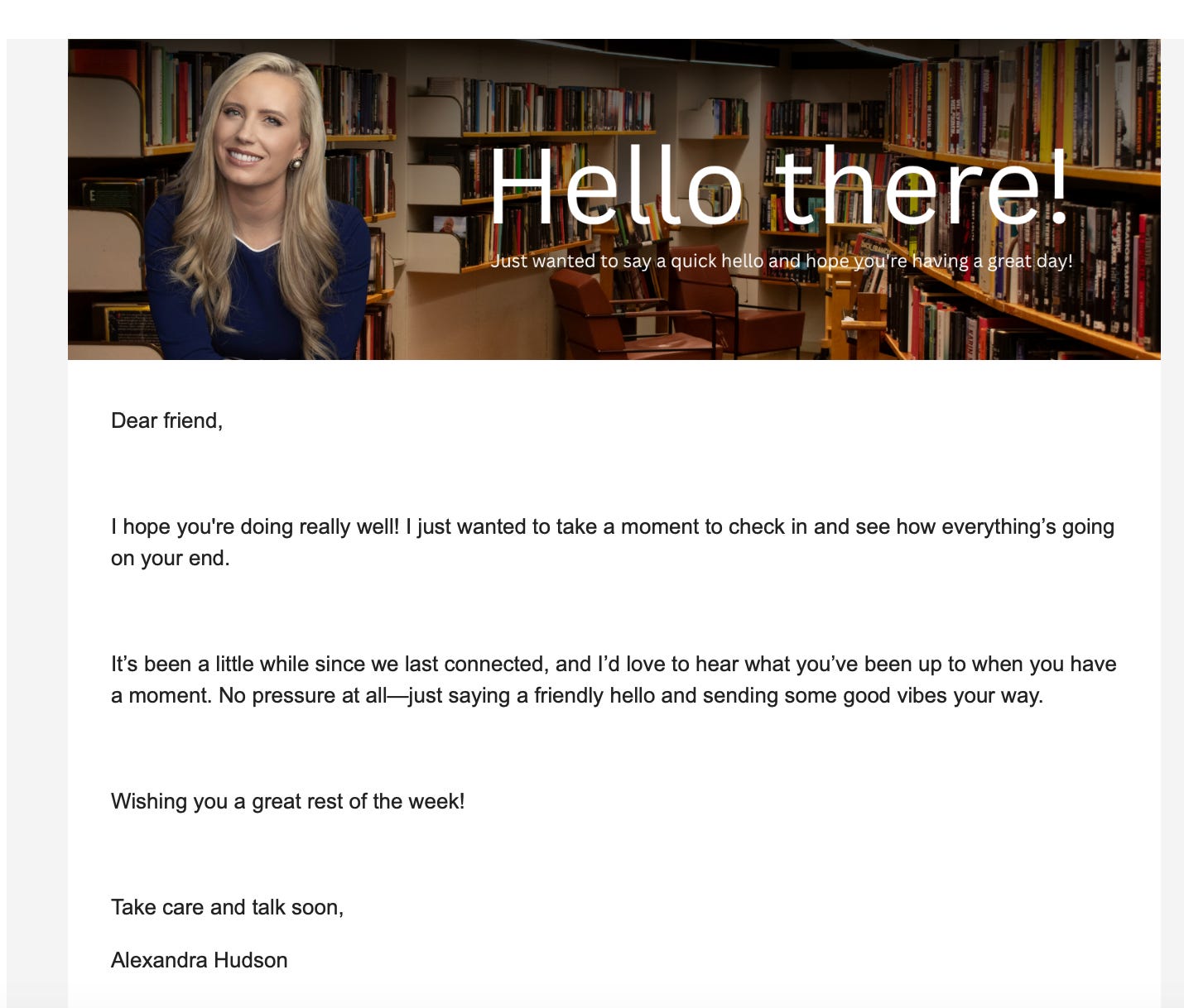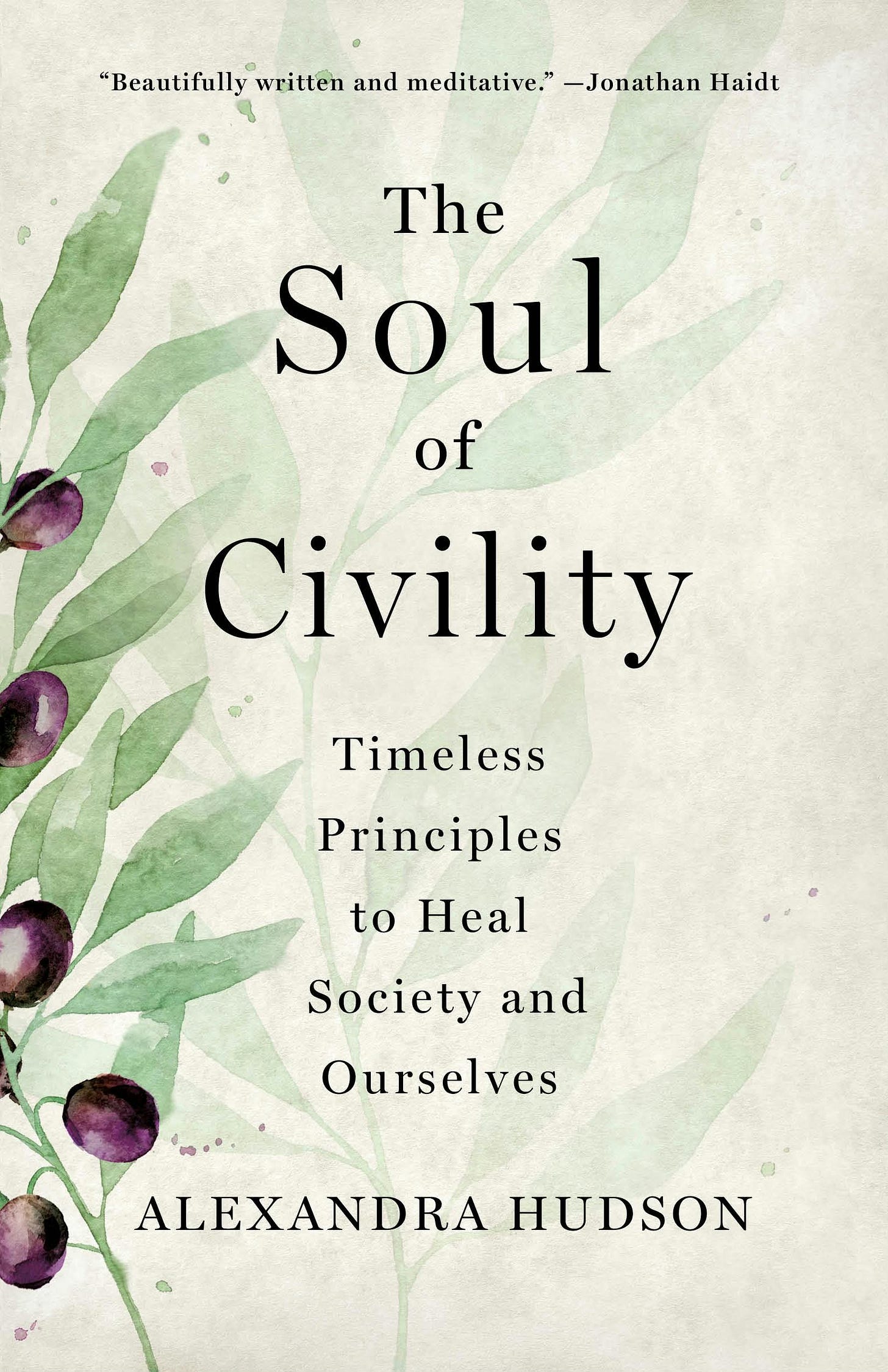Gracious reader,
Happy Dominion Day (July 1) to my Canadian readers, and happy Independence Day to my American ones!
Independence Day invites patriotism—but in our divided age, it also exposes a deeper conflict: how to honor a nation whose history is marked by both justice and injustice, beauty and brokenness.
Wabi-sabi, the Japanese aesthetic ideal of beauty in imperfection—where flaws, wear and weathering don’t diminish something’s value, but enhance it—can help us understand this tension about American Independence Day. It’s the patina of aged copper, the crack in a teacup repaired with gold, the worn stone floor smoothed by centuries of footsteps. Wabi sabi reminds us that time and imperfection do not erase worth—they reveal it.
America, too, is a kind of wabi-sabi creation. A republic founded on soaring ideals—life, liberty, the pursuit of happiness, equality before the law—that it has never fully lived up to. And yet, it is precisely that imperfection, that dissonance between who we are and who we aspire to be, that makes the American project so beautiful—and so worth defending.

Imagine the Liberty Bell—not with its crack hidden or ignored, but repaired with gleaming gold, its fracture transformed into a mark of dignity and resilience. This vision draws from kintsugi, the Japanese art of mending broken pottery with lacquer mixed with gold. Rather than concealing damage, kintsugi honors it, elevating the object’s history by making its fractures part of its beauty.
What if we saw America this way?
Rather than denying our nation’s flaws—our injustices, contradictions, and broken promises—we could choose to face them with honesty and care. Like kintsugi, we can highlight the cracks not to shame, but to repair, to reckon, and to rebuild. Our history is not flawless, but it is rich with struggle and the potential for renewal. In this light, a gold-laced Liberty Bell becomes more than a poetic image—it becomes a national ethic: to make visible what is broken, and to bind it with truth, accountability, and hope.
Our Imperfection Illuminates the Power of Our Ideals
That we were a nation founded on universal ideals while denying those same rights to many—enslaved people, women, Indigenous nations—does not make the ideals themselves hollow. It makes them essential. Precisely because we have fallen short, we are called to reach higher.
The Declaration of Independence proclaims that “all men are created equal,” written by a man who enslaved others. This contradiction is not a reason to discard the Declaration—it’s a reason to wrestle with it, challenge it, and ultimately live up to it. The ideals were not discredited by Jefferson’s hypocrisy; they are illuminated by it.
Frederick Douglass understood this. In his 1852 speech What to the Slave Is the Fourth of July?, he called out the injustice of America’s failure to live up to its creed—while also affirming the enduring promise of that creed. “The principles contained in that instrument,” he said of the Declaration, “are saving principles. Stand by those principles.”
This is the paradox at the heart of the American story: our deepest failures point back to our highest ideals. The ideals are not tainted by our imperfection—they are the tools by which we name, condemn, and attempt to repair it.
Our Flawed Founders and Historical Figures Still Have Something to Teach Us
We have entered a strange era of moral absolutism—where we expect figures from the past (and increasingly, the present) to be fully formed, flawless, and entirely aligned with modern values. But this is ahistorical, unrealistic, and profoundly inhuman.
The Founders were not saints. They were, in the words of Blaise Pascal, a mix of greatness and wretchedness—the full complexity of the human soul. Alexander Pope captured this with disarming clarity: “To err is human, to forgive divine.”
Jefferson wrote of liberty while holding people in bondage. Washington freed his slaves only upon death. John Adams opposed slavery but dismissed the idea of women’s political rights. These contradictions are real—and they are important. But they don’t mean we must cancel these men, erase them, or accept them uncritically.
We can, and must, take a Plutarchian approach to history: see virtue and praise it; see vice and condemn it, wherever and in whomever it is found. We don’t need our heroes to be perfect. We need them to be human. We need to discern, not deify—or demonize.
When we flatten people into saints or sinners, we lose the ability to learn from them. We deny ourselves the gift of complexity—the hard, slow work of wrestling with both inspiration and failure. We also risk holding ourselves to impossible standards. If perfection is the price of participation in the American story, who among us can pay it?
Our Ideals Are the Very Framework That Allow Us to Critique Ourselves
Here’s the central insight: America’s founding ideals give us the moral language—and the institutional framework—to hold ourselves accountable.
We don’t need to reject the country to challenge its wrongs. We can do so more powerfully because of the ideals written into its DNA. The promise of liberty gives us the right to protest injustice. The principle of equality under the law allows us to fight for reform. The right to free speech empowers us to condemn abuse and advocate for better.
Unlike many nations founded on bloodline, ethnicity, or conquest, America was founded on an idea. And ideas can be refined, reinterpreted, and reclaimed. We can be grateful for the structure we inherited—and relentless in making it better. This is the work of a citizen.
Final thoughts
America is not a perfect union. But it is, in Lincoln’s words, a “great unfinished work.” Like the cracked teacup filled with gold, like the copper roof turned blue with time, our imperfection doesn’t destroy our worth—it reveals our potential. Wabi sabi teaches us that brokenness, properly understood, is not failure. It’s history. It’s inheritance. And sometimes, it’s beauty.
In embracing America’s flaws—not excusing them, but facing them—we don’t diminish the nation. We dignify it. We continue the work of forming a more perfect union, one act of discernment, one generation, one civic conversation at a time.
Looking ahead:
August 28, 2025- Indiana Women's Collaborative, Indiana Chamber of Commerce
September 9, 2025- Indiana University Bloomington
The Polo Club of Boca Raton, November 3, 2025
A Note on Unwanted or Spam Emails
It has recently come to my attention that someone has been impersonating me and contacting members of this community under false pretenses. If you have received any suspicious emails claiming to be from me—or suggesting an affiliation—please forward them to ahudsonassist@gmail.com so that we may take appropriate action.
I want to assure you: I would never compromise your trust by sending spam!
Thank you for your understanding and your support.
In the news:
The Steep Price of Declining Civility- “Moral habits that promote human flourishing are virtues. Moral habits that divide us — within ourselves and between us and others — are vices.”- Thank you for mentioning my book, The Soul of Civility, in this thoughtful article!
The Bryan Hyde Show- Every single one of us can be a civilizing influence wherever we happen to be standing. Barry Brownstein reviews Alexandra Hudson's book "The Soul of Civility" and explains our personal duty to be a source of civil behavior. Any time we find ourselves a little too up-to-date on what's happening politically, it's time to take a step back and regain our perspective.
Is Silence Violence? How Yale Law School Reminded Me of the Virtue of Viewpoint Neutrality- “Viewpoint neutrality isn’t weakness — it’s a principled stand that respects disagreement and protects civil discourse.” Sharing my latest for WSB blog — interested to hear your thoughts!
The World’s Oldest Stories to Help Your Relationships! With Alexandra Hudson- Truth Changes Everything Podcast
I Love to Read: Author Alexandra Hudson to headline Zionsville Community Read event- Wishtv.com- Want to know the secret to doing politics well today? Doing politics LESS. We’ve allowed politics to take up too much of our mental consciousness, and it’s hurting society and ourselves. Join us in Zionsville at The Hussey-Mayfield Memorial Public Library on April 30th at 6:30 PM in the Lora Hussey Room to explore this and many other surprising ways to heal our divides.
Paideia, Humanitas, Civility and Education- I was honored to be invited to write this essay for The Ronald Reagan Center on Civility and Democracy. In a time often marked by division and discord, reflecting on the relationship between civility and education offers both wisdom and hope.
Thanks to Timothy Donahue of Oakland University for this thoughtful Public Books review of The Soul of Civility! He highlights a key argument: civility isn’t mere politeness—it’s essential for real social progress. Read here!
I had a great time joining Josh on the Good Morning Liberty podcast! We discussed historical lessons on civility, focusing on how John Adams and Thomas Jefferson overcame deep political divides to restore their friendship. Their story is a powerful reminder that mutual respect can heal even the deepest rifts. The episode is now live—tune in and let me know your thoughts!
It’s Time for a New Era of Christian Civility- read my latest piece for Christianity Today!
Thanks so much to MSNBC for hosting a segment about The Soul of Civility. Watch here!
A Year Ago on Civic Renaissance:
Edward Coles: The hero we need this Independence Day
Thank you for being part of our Civic Renaissance community!






One of the finest essays I've ever read. Thank you. This should be shared to a wider audience - say, Wall Street Journal.
“All men are created equal” is a rejection of the Divine Right of Kings that has nothing to do with slavery, which up to 1776 was a sad fact of the human existence since time immemorial, all across the world. America was founded by a people—Europeans—on refined ideas & culture of governance & law that stem back into Classical Antiquity; America (& Canada, Australia, etc.) is not simply “an idea”.
Sincerely appreciate the “Happy Dominion Day” for Canucks that is still an accurate term given that the British Crown still ultimately rules over Canada (whenever it really wants to, some day). “Canada Day”, the changing of the national flag, and the motivation behind it all is another rather insidious post-War “idea”, let's say for now.